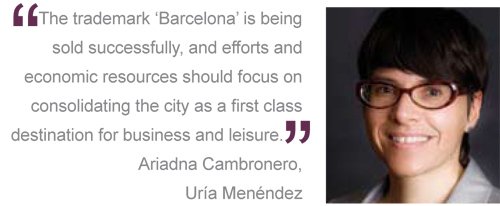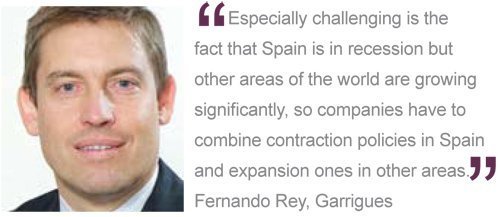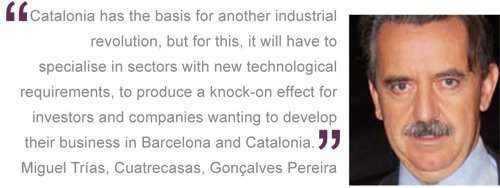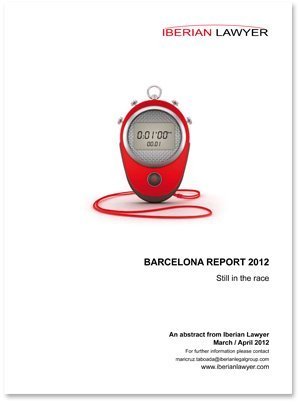Barcelona Report 2012: Still in the race
While the Catalan economy, local industries and the professions suffer the force of the recession, the message from lawyers is clear when it comes to the future ─ do not underestimate Barcelona.
Cataluña está sufriendo la recesión de forma profunda, con su economía y reservas puestas a prueba. No ha escapado nadie de las drásticas medidas impuestas: ni el sector público ni el privado. Pero el mensaje de los abogados es claro cuando se refieren al futuro: no hay que subestimar la fuerza de Barcelona.
Catalonia has not been spared from feeling the full force of the recession, with its economy and its reserves being tested to the full. Across the public and private sectors, no one has been able to escape what has become an almost obligatory regime of measures to mitigate the crisis, some more drastic than others, in particular for small and medium-sized businesses and entrepreneurs at the heart of Catalonia’s economy.
The public sector faces an extremely complicated situation given the deficit and heavy cost cutting policies. Catalonia was the first autonomous region that faced spending cuts to reduce its huge deficit, says Agustín Bou, Partner at Jausas in Barcelona, “which has had a huge impact on the level of spending and therefore business”.
The private sector is suffering from a lack of credit and funding, compounded by the delay in collection, and a slowdown in demand resulting in, among others, a loss of industry and an increase in the reorganisation and subsequent internationalisation of Catalan companies. Coupled with rising unemployment and bureaucratic barriers to foreign investment and opportunities, one would imagine, on the face of it, that the mood and the future would be rather flat.
But dig a little deeper and you find a region and a city, Barcelona, determined to achieve an ambitious urban, economic and social transformation to mitigate and conquer the challenges posed by Spain’s poor economic situation and the crisis worldwide.
However, the message from the Barcelona camp is not only positive but also very clear: “Although these are difficult times, they are not more difficult in Catalonia than in other regions of the country,” says Víctor Xercavins, Partner at Cuatrecasas, Gonçalves Pereira in Barcelona.
The immediate challenges that need to be overcome, according to lawyers, centre on three main issues: access to finance, taxation and bureaucratic barriers to investment.
Financial difficulties
With the lack of liquidity in the Spanish financial system, there is an ever-increasing difficulty in accessing finance. For the Catalonian entrepreneur, “one of the biggest inconveniences of this situation is that access to bank financing is still quite difficult,” explains Enrique Marinel-lo Jordan, Managing Partner at Monereo Meyer Marinel-Lo Abogados in Barcelona, “and at the same time, public subsidies are being reduced or have practically disappeared”. However, 2012 should be the year in which the restructuring of the Spanish financial system is expected to be completed, with the reinforcement of the equity ratios and the concentration of certain banks resulting from the merger of the former cajas into bigger players, says Fernando Rey, Managing Partner of Garrigues in Barcelona.
With a reputation as one of Spain’s most productive regions, Catalonia has a difficult fiscal deficit in comparison to the rest of Spain, and it pays the central government more in taxes than it receives in spending. And due to a lack of payment of funding included in its central budget, the resulting cuts are adding to its financial problems. “The Catalan economy is overstretched by the terms of financing we have within Spain,” says Gabriel Nadal, Managing Partner of Ecija in Barcelona, “probably the worse of any industrialised region in Europe”.
And while the recently-elected Catalan Regional Government appears to be focused on addressing and rectifying the problem, on the ground its support and results are not necessarily being felt, lawyers say.
Higher taxation
In a bid to reduce public deficit, Prime Minister Mariano Rajoy’s plans could also add to the already mounting tax pressures, with a potential increase in VAT on top of those already in place in relation to individual income tax.
And in Catalonia, the Regional Government adds to this an additional 4-5 percent, making it the region with the highest taxation in Spain and one of the highest tax pressures on individuals worldwide. “Before Barcelona can hope to compete with other economies, such as France for example,” says Rey at Garrigues, “it has to address what is an appalling tax situation”. This is proving a huge deterrent to both foreign investment and attracting talent, say lawyers, because this additional 4-5 percent of tax lowers individuals’ net income compared with the rest of Spain.
Domestic and international businesses and individuals looking to invest or work in the region are reticent, say lawyers, because they feel the tax regime is discriminatory. For a region that is so suited to, and in need of, more talent and investment, this makes no sense at all, lawyers say. “The region’s ability to plan and develop infrastructures is limited by a rather unbalanced tax and financial system,” adds Miquel Montaña, Partner at Clifford Chance in Barcelona, “which should hopefully improve. Good infrastructures are key for attracting foreign investment”.
While comparisons are, and will always be, made with Madrid, “there is an argument that Barcelona is treated in an unbalanced way”, says Javier Menor, co-Managing Partner at Deloitte Abogados y Asesores Tributarios in Cataluña, “but maybe it’s more a question of whether politicians (acting independently) are using the powers they have in order to make Spain and Barcelona business friendly”.
Bureaucracy
Another factor causing difficulties for foreign investors is the amount of bureaucracy inhibiting the easy passage and entry of trade into the Catalan markets. Something that is echoed across the profession is that the mindset and tradition of overregulation needs to be overcome, with lawyers full of examples of frustrated clients looking to do business in Spain who cannot comprehend the time it takes for even simple contractual matters to be achieved. “There is still too much bureaucracy in Catalonia and in Spain,” says Xercavins at Cuatrecasas, “and we definitively need to be more business friendly if we want to compete successfully in the international arena”.
And while public administrations may not have the money, says Joan Roca, Managing Partner of Roca Junyent in Barcelona, “they do have the capacity to legislate to make things easier for foreign investment”. What needs to be addressed is who is giving value to the territory, says Esteban Raventós, Managing Partner of Baker & McKenzie in Barcelona, and to assist entrepreneurs and executives willing to come or stay in Barcelona.
 Labour reform
Labour reform
One cannot forget the radical new labour reform and its implications, which the Catalonia Regional Government is currently implementing. The reform tackles rigid and expensive employment regulations that were, according to lawyers, a deterrent to foreign investment despite a highly qualified local working force. While too soon to see results, it is anticipated that, in the short-term, companies will take advantage of new labour measures to reorganise. However, only in the medium-term, says Rey at Garrigues, when the economy reboots, will we see an increase in employment, as companies should then have more economic flexibility to be able to recruit.
The recession in Spain is estimated to last at least another year or two, “to which the Catalan market will not be an exception”, says Gerard Serra, Partner and Head of the Barcelona office at Pérez-Llorca. However, both the Catalan and Spanish Governments are taking steps to ease the way for domestic industry and companies to operate in foreign markets, adds José Ignacio Parellada, Managing Partner of Ramón y Cajal Abogados in Barcelona. “These changes, together with the measures implemented by the local and State Governments to restructure the financial entities and to ease the financing and funds injection to companies and small businesses, are expected to allow a strong recovery of our businesses and foreign investments in Catalonia.”
Government measures
The Catalonia Regional Government was the first to implement measures to mitigate the crisis, reduce deficit and actively promote economic recovery. Catalonia has been a pioneer in Spain in adopting austerity measures and cuts, says Miguel Trías, Managing Partner of Cuatrecasas, Gonçalves Pereira in Barcelona – a sentiment felt across the board.
“Let’s not forget about the incredible effort on the part of Autonomous Communities aimed at the reduction of public deficit that is significantly impeding the implementation of new projects in the traditional industrial sector of Catalonia and considerably affects the investment into R&D,” adds Marinel-lo at Monereo Meyer Marinel-Lo Abogados.
Therefore, while the Catalan economy is in intensive care and undergoing major surgery affecting a number of its damaged organs, says Antoni Valverde Roy, Corporate Partner and Head of Freshfields in Barcelona, “the positive signs are there: for example, foreign investment – particularly from Asia – is starting to arrive, IT and bio-science sectors are full of energy, leisure and tourism are hanging in there and industrial exports are on the rise for a second year in a row”.
Attracting foreign investment to re-activate the economy features high on the agenda – “but not just economic investment”, explains Trías at Cuatrecasas. “We also need to capture and retain local and international talent, and we need to encourage new businesses and ensure companies export goods.”
Exports are undoubtedly seen as a hope towards boosting the economy, as is the possible upturn of other Western economies. “But the European attitude towards cutting budget deficits in the short-term without coupling these measures with stimuli to investment is excessively rigorous and pro-cyclical,” warns Carlos Valls, Managing Partner of Iuris Valls Abogados in Barcelona.
 You need only look at the already well-established 22@ Barcelona and the Barcelona Economic Triangle project (the Besòs, Llobregat and Vallès districts) to see evidence of a thirst for opportunities in knowledge-intensive sectors of industry, hoping to generate foreign investment and create domestic employment opportunities to aid the recovery of the Catalan economy. “Barcelona is looking to boost the entrepreneurial capacity of its businesses,” explains Marinel-lo at Monereo Meyer Marinel-Lo Abogados, “and, we can already observe the movement in various sectors of the economy towards the increase of such awareness and importance”.
You need only look at the already well-established 22@ Barcelona and the Barcelona Economic Triangle project (the Besòs, Llobregat and Vallès districts) to see evidence of a thirst for opportunities in knowledge-intensive sectors of industry, hoping to generate foreign investment and create domestic employment opportunities to aid the recovery of the Catalan economy. “Barcelona is looking to boost the entrepreneurial capacity of its businesses,” explains Marinel-lo at Monereo Meyer Marinel-Lo Abogados, “and, we can already observe the movement in various sectors of the economy towards the increase of such awareness and importance”.
Industry
There has also been a decline in the operations of traditional Catalan industries, say lawyers, with the slowdown of the EU economy affecting Catalan enterprises, especially those dependent on the local or Southwest EU market. “Especially challenging is the fact that Spain is in recession,” says Rey at Garrigues, “but other areas of the world are growing significantly, so companies have to combine contraction policies in Spain and expansion ones in other areas”.
However, this perceived ‘decline’ could also be the result of Catalonia’s evolution from a primarily industry-led economy to an increasingly knowledge-led one, moving forward and opening to new sectors. “Catalonia has the basis for another industrial revolution,” says Trías at Cuatrecasas; “but for this, it will have to specialise in sectors with new technological requirements, to produce a knock-on effect for investors and companies wanting to develop their business in Barcelona and Catalonia”.
Traditional and new industries are coming to take advantage of Barcelona’s history and trademark, say lawyers, to build relevant brands and headquarters. Logistics, pharma, life sciences, media, R&D, technology and tourism, among others, are firmly embedding themselves into the region, and, if promoted well, could give Barcelona an incredibly strategic position in the world’s markets. “In recent times, some politicians said that ‘industry is not the future for Barcelona’ – I disagree with such a statement,” says Raventós at Baker & McKenzie. “I believe that the balance between new economy and our industrial tradition is the way to move forward.”
Going global
More so than anywhere else in Spain, companies in Catalonia are going global, lawyers say, looking for growth abroad especially in sectors where regulation has increased, such as in renewable energies. “We are seeing a new pragmatism in terms of companies internationalising,” says Rey at Garrigues.
Clients are beginning to opt for countries that offer professionals with more comparative qualifications, reasonable costs of investment, easier access geographically, says Legido at BDO, and that are positioned in consolidated markets.
And where the clients go, the lawyers are following. “Reality has shown us that both the Catalan and the Spanish markets have had to develop a clear international focus, whether by exporting, seeking foreign investment, or attracting and offering a skilled workforce,” says Trías at Cuatrecasas, “and we have tried to move with our clients and take advantage of our international presence”.
Lawyers are seeing a strong interest for markets closer to home, such as Eastern European countries, the Gulf Cooperation Council countries or Northern Africa, as well as further afield to the BRICS and Asia. Many are also heading towards the traditional Latin America countries, Brazil primarily, but also Colombia and Peru. “The strategy of legal business has changed over the past five years,” says Raventós at Baker & McKenzie. “In the past, we used to focus on foreign investments coming to Spain; nowadays we are helping local clients to go international, not only to mature markets, but also to the BRICS and emerging markets.”
This does not mean to say that firms are changing identities to become solely ‘international’ and forgetting their roots. Many firms with well-established international practices or presences are capitalising on their ability to serve their clients’ legal needs worldwide, making them, as is the case with Freshfields, “truly international and truly Catalan at the same time”, says Valverde at Freshfields. Others are reinforcing and strengthening international capabilities, with the creation of international desks with professionals with a good knowledge of the culture and country where the client wishes to invest, says David Miranda, Partner at Osborne Clarke in Barcelona, which is another important tool to attract clients.
 Fees
Fees
The question of the level and types of fees law firms charge continues to play a crucial role in attracting clients, say lawyers, as they are increasingly demanding high quality legal services at reasonably priced rates. “Clients are still demanding quality services,” says Miranda at Osborne Clarke, “but also requiring legal fees to be adjusted to tighter budgets – so capped quotations and blended fee arrangements are more usually requested”. Success fees, for example, were historically seen as a loss of independence for lawyers and something that only a few years ago lawyers would have resisted doing, says Raventós at Baker & McKenzie – “but we have to accept the new reality”.
While lawyers continue to resist client pressure to discount rates, the key challenge becomes meeting the demand to adapt fees to the new economic climate. This will require a reduction in overall law firm costs, which will impact on remuneration, and fixed salaries will be increasingly unsustainable as more performance-based models will take over, say lawyers. “New variable schemes of remuneration will need to be in place,” says Valls at Iuris Valls, “the leverage will be reduced and more hands-on partners will be required”. Firms will need to structure themselves so as to face the price war that is already taking place and the opportunity is clear for small or niche firms, and for larger firms that are particularly efficient at reducing costs.
Demonstrating ‘value’
While there is a great deal of work around, says Coward at Uría Menéndez, “clients are less willing and often less able to pay historic rates, and, due to new market conditions, are in fact paying less.” Firms are therefore having to adapt in various ways to ensure they keep up with the needs of their clients, and the main driver, say lawyers, relates to demonstrating ‘value’. “What do our clients value? What are their interests and concerns?,” says Raventós at Baker & McKenzie. “We have to make their priorities, our priorities.”
In times of economic downturn, the challenge is finding new ways of adding value to their clients’ business. They have many complex needs that are not being addressed and it is these needs that lawyers should be looking to resolve, says Montaña at Clifford Chance. “We are adapting to the downturn by making sure that our advice adds value to our clients, that this value is perceived and, if possible, quantifiable in the short-term,” says Daniel Marín, Partner at Gómez-Acebo & Pombo in Barcelona, “and we are actively offering some services that clearly and measurably provide important savings to our clients”.
“We are adapting to the downturn by making sure that our advice adds value to our clients, that this value is perceived and, if possible, quantifiable in the short-term,” says Daniel Marín, Partner at Gómez-Acebo & Pombo in Barcelona, “and we are actively offering some services that clearly and measurably provide important savings to our clients”.
Developing new legal products that solve these problems would also add value to a client’s business, but this requires investing time in to developing such solutions, says Montaña at Clifford Chance, which is much more difficult than continuing to sell the same products at a lower price. “But lowering prices is counterproductive in the long run, because it reduces the sector’s ability to attract the best talent and, in turn, develop new products to meet needs that have not yet been met,” he adds.
The role of the lawyers themselves is also changing, and they are now having to be many things that years ago were not part of the role, says Menor at Deloitte, including being as business-minded, multi-disciplinary and international as their clients. They are taking on a much more trusted lawyer role than before, and “Barcelona is doing its homework”, says Roca at Roca Junyent, to ensure they can be there for their clients every step of the way as they look to go global.
Proximity is also something that is regarded as a cornerstone for cementing long-term relationships that will last long past the duration of the crisis. It’s crucial to gain clients’ trust and to work closely with them for the long-term, say lawyers, rather than only working for specific transactions in the short-term. And this proximity does not just apply to those that are surviving, but also to those that are suffering. “It is when clients are living the worst of times, when you have to be closer to them,” says Montaña at Clifford Chance.
Looking ahead
It is unlikely that many law firms will not feel the pressures of 2012 and 2013, which are going to be key years in Catalonia’s economic recovery – some will merge and others will be dissolved. The Catalan market is highly fragmented and there are the same number of firms competing for a market that has been reduced by half, says Legido at BDO. “This means, as is already happening, that big firms are having to let many of their staff go and that small and medium sized firms are merging, leaving the Barcelona market or disappearing all together.”
Consolidation, however, is not necessarily a bad thing, particularly in a market of the size of Barcelona, where a smaller number of larger firms could be a good way to ensure that Barcelona becomes a city of ‘headquarters’ rather than just regional offices. “Being the biggest is only important in a few transactions or for a few clients, says Luis Marimón Prats, Partner at Marimón Abogados in Barcelona. “We believe that the market is going to be more favourable for mid-sized firms. Cost efficient solutions are what mid-sized firms have to concentrate on.”
Law firms will also be implementing streamlining processes, if they have not already done so, meaning knowing better than ever how to manage their resources by taking moderate steps, says Trías at Cuatrecasas. “It is important to know how to reconcile growth with market restrictions, which is not easy, as it means expanding the activities of practice areas where activity has dropped and strengthening areas that may present more business opportunities.”
While many firms will attempt to adapt their business model to try to improve their figures and futures, looking long-term is also key, and being careful to not make a kneejerk reaction to the crisis in the short-term. “While we cannot isolate from the economic downturn, we do not want to change the type of law that we practice or the type of firm that we want to be because of the economic situation,” says Marín at Gómez-Acebo & Pombo. “We continue to believe that providing the best service and selecting and training the best talent is the only path to long-term profitability.”
Going forward
In short, in a constantly changing environment, those firms that understand that times have changed and can adapt to the realities of a new economy, accompany their clients, and offer high quality multidisciplinary services at competitive costs will stand the best chance of surviving and thriving.
For the profession as a whole, the legal landscape has also changed; and while law firms are competing with each other, says Xercavins at Cuatrecasas, “we have common goals and we need to tackle these together”. This need to join forces is echoed across the board. “The legal community needs to act together to help the Government understand what lawyers are facing day-to-day with their clients,” says Raventós at Baker & McKenzie, “and develop a more business friendly environment”.
As for Barcelona, it is impossible to foresee the long-term future of the economy, but the short-term requires a huge amount of effort, hard work and sacrifice to recuperate previous standards of living, and regain its former economic position within Spain and Europe. Realistic measures must be taken to revive the economy on the part of the Government, the industry, the professions and the city itself.
They are on the right track, says Legido at BDO; the austerity measures and cutbacks that have been made are a good start, but now is the time to encourage investment within Catalonia, to promote tax incentives, eliminate excessive bureaucracy and analyse in detail strategic markets such as luxury tourism, technology, and the pharmaceutical and R&D sectors, among others, he adds. Together with better terms of financing, taking advantage of increased exports to emerging economies, encouraging the internationalisation of the economy and fostering a fiscal regime that attracts foreign investment and individuals, this will all help bring much-needed stimulus to the Catalan economy and ensure its stability in the long-term.
Barcelona needs to take full advantage of this crisis to reinvent itself and capitalise on its trademark and reputation for entrepreneurial innovation. It is very clear that the city has both the potential and the will to do so, and the underlying message from lawyers is clear – do not underestimate Barcelona. One would be wise to take their advice.












